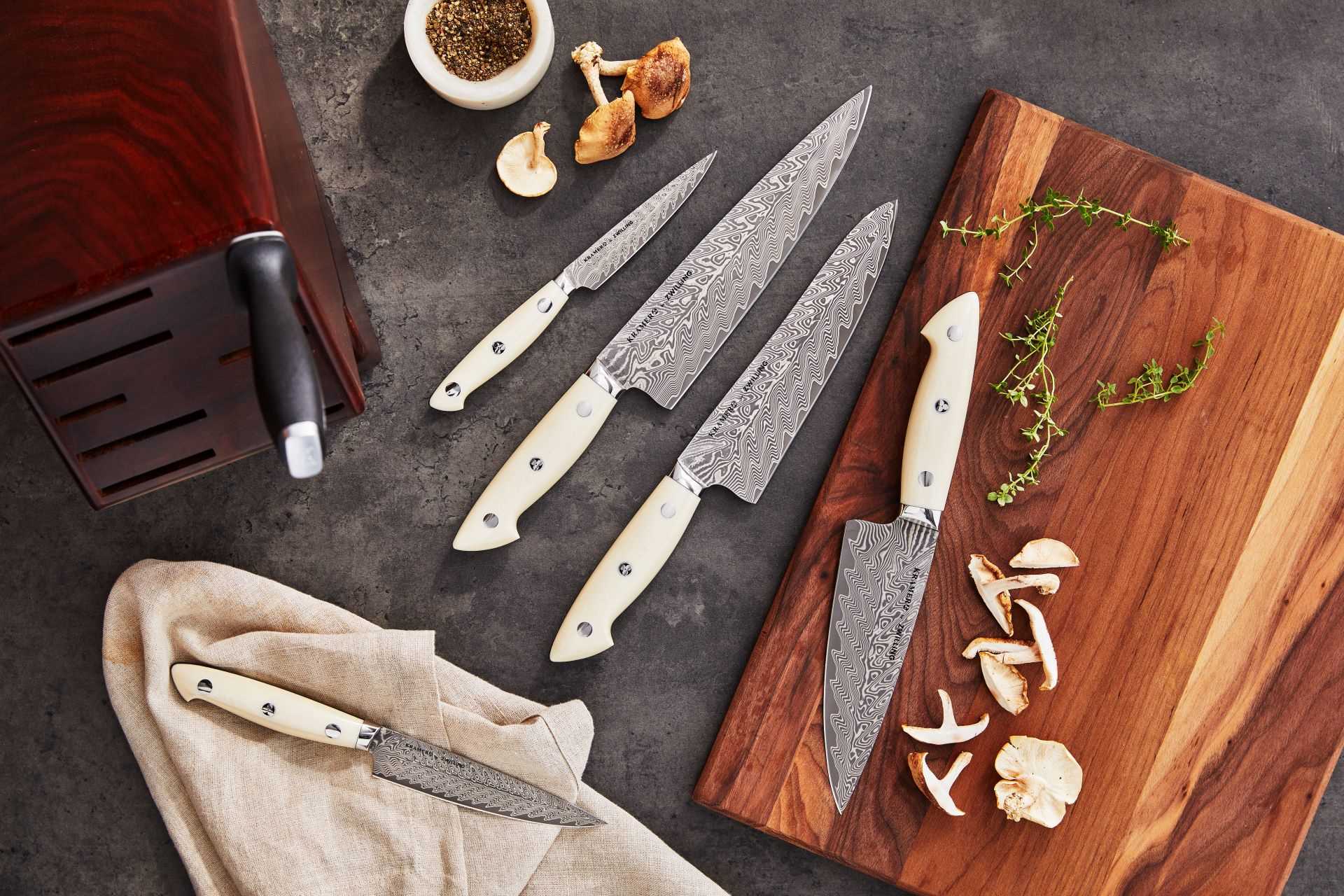Decisions, decisions.


If you haven’t already fallen head over handle for the new, absolutely stunning Cumulus knife set from renowned bladesmith Bob Kramer, here’s your sign to head to our site and ogle at the gorgeous Damascus blades and ivory-like handles.
To celebrate the launch, we sat down with Bob to learn a little more about his passion for knife making, his favorite thing about the Cumulus set and his 5 most important tips for choosing a knife.
Oh, and of course, we had to ask about that time he smoked salmon on a piece of meteorite with Anthony Bourdain.
It’s nice to meet you, Bob! I’m relatively new to Sur la Table but I’ve been hearing about your knives since day one. I’ve spent some time on your “About Me” page and combing through old interviews, but, for the sake of interview tradition, can you give me a quick little overview of how you got into knife making?
I was working at the Four Seasons, going to [community] college, and I was essentially working full time and carrying a full load at school.
And I just realized that if I worked this hard on my own business, perhaps I’d be successful. So, I quit school and started a knife sharpening business, and I sharpened knives all around Seattle for about five years. And then, I wanted something more. So, I decided I was gonna learn to make knives.
What was it about knives that made you want to do this as a career?
When you cook, especially when you cook banquets for a big hotel, it can take several days of work just to bring the banquet together… it can be very time-consuming. And then the party comes in and all the food is consumed, and you begin all over again.
And there was something about that that was not that satisfying. When I took a knife-making class, I’m still working with fire—I’m working with steel, with hammers—but I’m making a tool that might take the same amount of time, might take 3 days to make that knife but I have that knife for the rest of my life. And I get to use that knife over and over and over again.
For me, I kind of perceive it like a battery: it’s a concentration of energy that doesn’t dissipate. I can put all that energy into a meal and hopefully, that makes the memory or experience, but that’s quite ethereal compared to a tool.
In the “About” section of your website, you mention the 1998 profile in Saveur Magazine as a major milestone – can you tell me more about that? Did you expect the kind of reaction that the piece drummed up?
No, I was clueless.
It was a local tabloid newspaper, the guy used to write for that newspaper. So, when he came into my store, he was picking up his sharpening and I recognized his name on his check. He said to me, “I’d like to do an interview,” and I said, “Okay, let’s do it.” But we never talked about where that was gonna go, like what that interview was going to be for.
I just wanted publicity, I’d take anything you know, I’d write my name on the bathroom wall and “knife sharpener” and put my number there. That was fine, I’ll take it.
It was fairly in-depth—three days of 2-hour interviews—and they sent in a photographer who stayed for the whole day. So, I knew it was gonna be substantial. But I didn’t know what Saveur was, so I had to go buy one to really get a sense for the magazine.
Then, my wife and I were having breakfast and I said to her, “I think this article is going to be kind of big,” and she asked, “well how many knives do you think you’ll sell?”
And I said “Twenty.” And it was huge.
How off base was that ‘twenty?’
Hmm, probably a factor of 20.
Oh wow. Definitely very different. How long had you been in business at that point?
Well, that was ’98 and I actually started my knife sharpening business in ’86.
So about 12 years?
Yeah, so 5-6 years of sharpening and then 5 years of making knives and sharpening knives.
One of the more positive outcomes we’ve seen from the pandemic is a huge uptick in home cooking – you know, as people were stuck at home, a lot of them turned to cooking as a creative outlet and have held on to that and continue to cook at home and explore recipes. They’ve also grown more interested in developing skills and investing in quality tools to help make them better cooks.
So, let’s say someone is looking to invest in better knives but really doesn’t know how to choose or what to look for – what would you say are the 5 most important things to look for in a knife/knives?
How often would you say a ‘rule of thumb’ is [for sharpening]?
Once a year. Professionally sharpened or learn to use a sharpening stone and do it yourself.
Alright, we’re running near the end of our time so one final question: tell me about the knife you made for Anthony Bourdain. How did that come about? Why did you choose to experiment with meteorite?
So, I had been experimenting with meteorites—they’ve been around since before man, and so, mankind has always, sort of, coveted a meteorite because it comes from the stars, from outer space.
And they’ve been into tools and knives, ceremonial items way, way back in history. So, I’ve always been fascinated by that, and I had them laying around and experimenting with them in my shop.
Then, I meet Anthony Bourdain when I won the Raw Craft award. We met at luncheon and kind of talked throughout lunch and they decided to come and shoot a “Raw Craft” at my shop. We basically spent the day; I showed him how a knife was made and at the end of that meeting he said he’d like to have a blade.
So, I asked him a few things and he said, “Do your thing. Make me whatever you want, whatever you think I would enjoy.” And I knew I had to incorporate the meteorite—I mean, it’s a star and he’s a star.
We cooked some salmon. Part of the “Raw Craft” shoot was that we needed to cook together. And they were like “what do you cook in your shop?” And I told them, “I don’t cook in my shop, I mean, I cook steel.”
As I was working and thinking about him coming to visit me, I thought, “We have to do something different.” We live in the Northwest and salmon is, you know, top of the list. And I wanted to do an interesting cook in my shop, so I heated up some meteorite and we smoked some salmon.
What kind of knife does meteorite produce? Like as a tool?
Meteorite is just a component, it’s one piece of the recipe.
There are 3 kinds of meteorite—the one that I use is an iron/nickel meteorite. So, it’s high in nickel, about 7% nickel, and that adds a bright, shiny layer or multiple layers to the steel.
Then I sort of spice that up by adding carbon to that, which makes it hardenable [sic].
That’s so cool! I know people were excited about it, I heard that that knife sold for like $300,000 or something like that.
Yeah, I think the hammer price was $231,000. But that wasn’t me, that was Tony.
But still, someone gets to be like “I have a meteorite knife that Anthony Bourdain used,” that’s really cool.
So, we have a little bit of time left and I’m curious, can you tell me what your favorite things are about the new Cumulus line?
Yeah, the Cumulus line is beautiful and gorgeous, to begin with. It’s really comfortable, I love the handle material and I’m really happy we found that stuff.
It looks like ivory, but I never use ivory, I just don’t agree with the whole practice—I really like elephants—but we have an ivory look on the handle. It’s actually a phenolic resin, which is incredibly durable. So, we kind of have the best of both worlds. We have the aesthetic of the ivory look, but we have the durability of a really modern laminated plastic material.
What did you say the handle was? A resin?
Yeah, it’s micarta and it’s phenolic resin and cloth blended together. But yeah, they’re beautiful, they’re comfortable, the core steel is SG2 which is a tried-and-true high alloyed stainless. It takes a nice edge and holds it for a long time, it’s easy to sharpen and the Damascus on it is just gorgeous.
Who do you think would enjoy the new Cumulus set the most?
Honestly, everybody is digging them. I have twenty knives in my kitchen—I’ve got kitchen knives from Japanese swordsmiths, custom stuff that I made, commercial stuff—and the knives everybody gravitates to in my kitchen is the Cumulus line.
Which is sort of frustrating, but also makes me super happy because I think they’re really beautiful. I think anybody that digs the look of the line is going to like the performance of them.
Want to learn how to master the blade and handle your knives like a pro? Check out one of our knife skills classes!
JOIN THE CONVERSATION